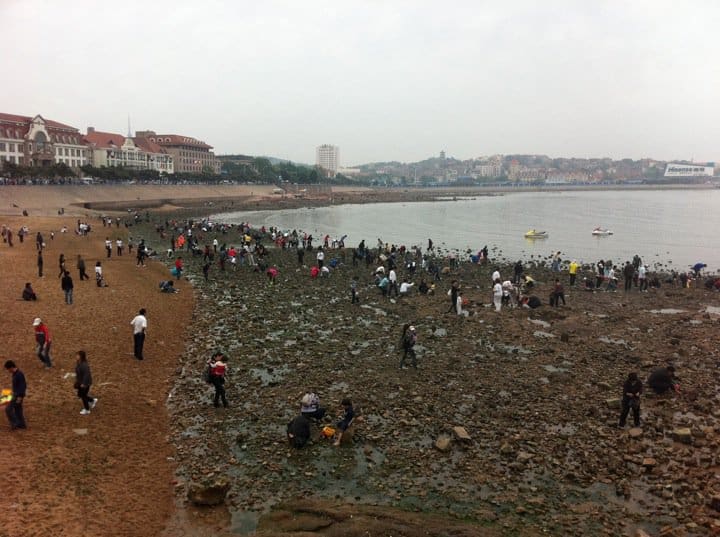Harvesting the Tides: Local Mollusk Collecting in Qingdao for the Market
In Qingdao, a coastal city famous for its maritime heritage, the rhythm of the tides plays a crucial role in daily life. While the ebb and flow of the sea is a natural spectacle that draws tourists and beachgoers, it also signals the beginning of an age-old tradition for many locals: collecting edible mollusks. As the tides recede, revealing the rich bounty of the Yellow Sea, local harvesters venture out to gather these prized marine delicacies, which are then sold in bustling markets and enjoyed by families throughout the region.
The Tradition of Mollusk Harvesting
Mollusk collecting has been a part of Qingdao’s coastal culture for generations. The city’s location along the Yellow Sea provides an abundance of shellfish, including clams, mussels, and oysters, which thrive in the nutrient-rich waters. These mollusks are not only a staple in the local diet but also a source of income for many families who have passed down the skills of harvesting from one generation to the next.
The practice of collecting edible mollusks is deeply rooted in the community, blending the knowledge of the sea’s cycles with a respect for nature’s offerings. Harvesters know the best times to collect, which species to target, and how to do so sustainably to ensure that the resources remain abundant for future generations.
The Process of Collecting
When the tides ebb, exposing the sandy flats, rocky shores, and intertidal zones, local collectors—often working in small groups or families—make their way to the beach. Armed with simple tools like rakes, baskets, and nets, they begin their search for the day’s catch.
Clams and Cockles: Collectors dig into the sand where clams and cockles are buried, often just beneath the surface. The process requires a keen eye and knowledge of where these mollusks are likely to be found, often indicated by small holes or mounds in the sand.
Mussels and Oysters: Mussels and oysters are typically found attached to rocks or in crevices. Harvesters pry them loose with care, ensuring that they leave behind the smaller ones to grow and maintain the population.
The collection process is labor-intensive but rewarding. It requires patience, skill, and an understanding of the natural environment. For many locals, this work is not just about making a living; it’s a way of life that connects them to the sea and their heritage.
From Shoreline to Market
Once the mollusks are collected, they are carefully cleaned and sorted. The freshest and best-quality specimens are then taken to local markets, where they are sold to eager buyers. Qingdao’s markets, particularly those near the coast, are vibrant places filled with the sounds, smells, and sights of the sea.
Mollusks are highly sought after for their flavor and versatility in cooking. Clams are often used in soups and stir-fries, mussels are steamed with aromatic herbs, and oysters are enjoyed raw or grilled. The freshness of these mollusks, harvested just hours before they reach the market, is a major draw for both locals and visitors.
In addition to selling at markets, some harvesters also supply local restaurants, where the mollusks are featured in traditional Qingdao dishes. The city’s cuisine, known for its emphasis on fresh seafood, owes much to the hard work of these local collectors.
The Importance of Sustainability
Sustainability is a key concern for mollusk harvesters in Qingdao. Overharvesting can lead to depleted populations and long-term damage to the ecosystem. To prevent this, many collectors adhere to traditional practices that ensure the mollusk populations remain healthy.
For example, collectors often follow guidelines that dictate when and where mollusks can be harvested, allowing certain areas to rest and recover. There’s also a focus on collecting only mature mollusks, leaving the smaller, younger ones to continue growing and reproducing. These practices reflect a deep understanding of the delicate balance between harvesting and conservation.
A Way of Life
For many in Qingdao, collecting mollusks is more than just a job—it’s a way of life that ties them to their community and the natural world. The knowledge and skills required for mollusk harvesting are passed down through generations, creating a sense of continuity and connection to the past.
The tradition of mollusk collecting also fosters a sense of pride in the local culture and cuisine. The mollusks collected by these hardworking individuals contribute to the rich culinary heritage of Qingdao, ensuring that the flavors of the sea remain a central part of the city’s identity.
Final Thoughts
Collecting edible mollusks in Qingdao during low tide is a testament to the city’s deep connection to the sea. It’s a practice that combines hard work, tradition, and sustainability, providing both livelihood and nourishment for the local community. As you enjoy a plate of fresh clams or a steaming bowl of mussels in Qingdao, you’re not just tasting a delicious dish—you’re experiencing a piece of the city’s culture, shaped by the tides and the hands of those who harvest its bounty.
Share this post using the icons below.

